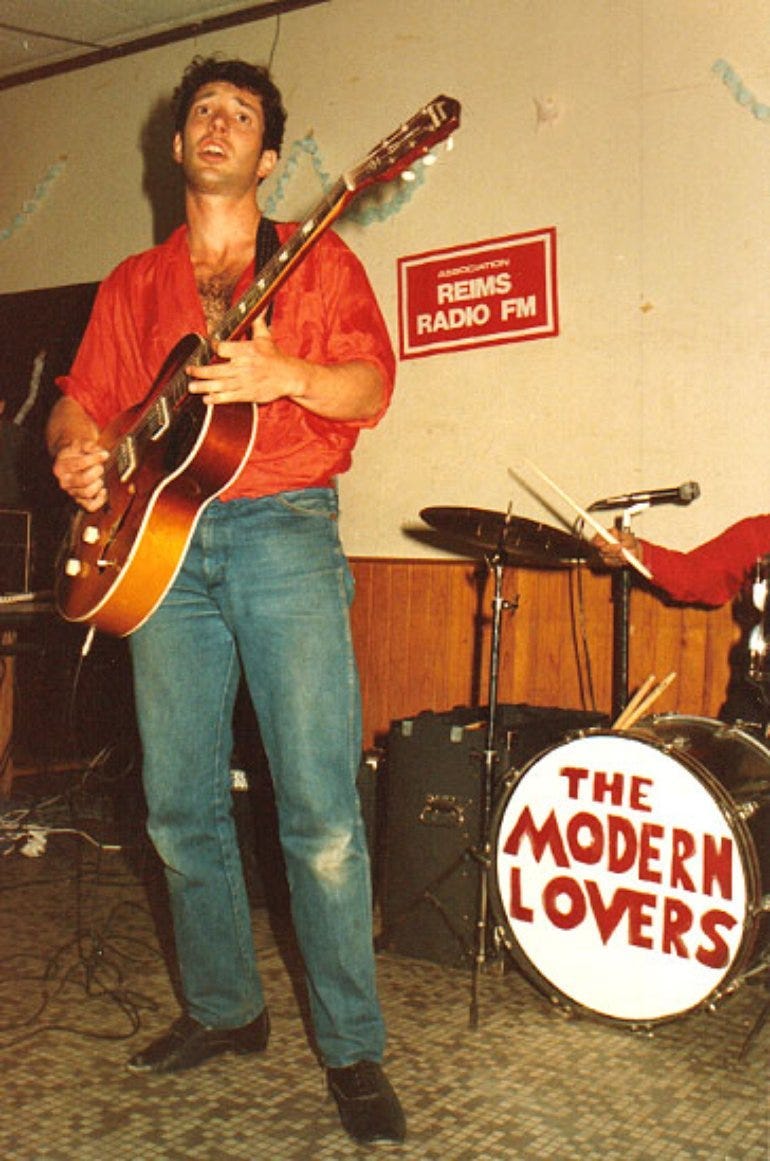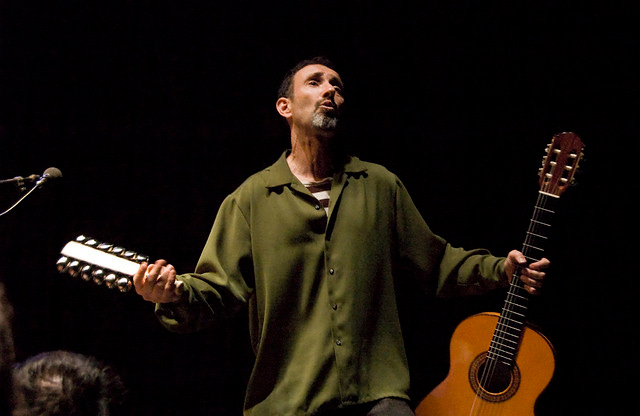Listen Up: Jonathan Richman
What once was a puppy is now a dog. And what once was a piglet is now a hog.
I saw Jerry Harrison, the former guitar player and keyboardist for Talking Heads, on Prince Street yesterday. Harrison must live in Soho. That’s where I work, and this is the third time I’ve spotted him in the past year (Actually, I’ve seen David Byrne riding his bike through Soho more times than that, so he must be a local, too.)
I had a brief, amiable conversation with Harrison several months ago, so I didn’t say anything to him this time. But this visitation by the New Wave rhythm guitar giant got me thinking about Harrison’s first, far less successful band, the Modern Lovers, which was led by a rather odd young man named Jonathan Richman.
Richman is older than me—I just turned 62, and he’s 74 now—but one has to approach his age as a mere technicality. There came a point in this guy’s recording career where he actually immatured, and he hasn’t matured a day since then. He wears wistful perceptions and childlike wonder the way Bruce Springsteen drapes himself in working-class leather and faded denim.
Richman was born in the U.S.A. (Boston, to be precise) and then made what appears to be a conscious decision to basically never grow up. If Peter Pan were a singer-songwriter, surely he’d sound like Jonathan Richman.
It didn’t start out that way.
In 1970, Richman, a hardcore Velvet Underground fan who was so loyal Lou Reed actually knew his name, was inspired by his downtrodden New York City heroes to form his own group. That group would soon include the previously mentioned Harrison, who would one day be burnin’ down the house and not making sense with Talking Heads, and David Robinson, later to achieve fame and fortune as the drummer for the Cars.
Richman named his band the Modern Lovers, and, for a little while there anyway, they played punk rock before music critics even started calling it that. I mean, the Modern Lovers were in the forefront of punk, along with such torchbearers as the Velvets, the MC5, and the Stooges. Forget the critics—Richman and his buddies were likely making a racket before Johnny Ramone had even bought a guitar.
They may have been barely out of high school, but these guys were good, in the “three chords and a cloud of dust” manner that would light anti-social fires for several decades to come and now seems virtually antiquated for its balls-out energy, dark humor, and unbridled passion.
Don’t believe me? Try this anthem on for size. It’s called “Roadrunner,” and it’s the opening track on the Modern Lovers’ self-titled “debut album,” which was really just a bunch of demos recorded by Velvet Underground co-founder John Cale in ‘71 and ‘72 then finally released to critical acclaim, if not commercial success, in 1976.
If you don’t appreciate the spirit in that—the song isn’t about anything at all except driving around a dead-end town and blasting music on the radio—you might be on the wrong Substack page. (There’s even a recording out there of the Sex Pistols attempting to play “Roadrunner” during a rehearsal session, not that Johnny Rotten could remember the words. Steve Jones tears it up, though.)
So that’s what the Modern Lovers were up to until 1974. Then something unexpected happened—Jonathan Richman suddenly became 8 years old. Harrison, for one, was devastated by this bizarre development and promptly left the group.
I get a big kick out of a lot of the music Richman made after the original Modern Lovers disbanded, but it has about as much to do with “Roadrunner” as a Scooby Doo cartoon has to do with a stiff shot of tequila. I could try to describe it to you in advance, but it’s probably best to simply have you listen to “Here Come the Martian Martians” off of Jonathan Richman and the Modern Lovers, which Richman has always considered to be his actual debut record.
Prepare yourself.
How can you not be touched by Jonathan’s concern for buying exactly the right kind of ice cream for the Martians? I know I am. But I can see where the guy who played burning, African funk-influenced guitar on Remain in Light might not be so moved.
You tell me what happened here.
Richman later said that he was so taken with the lighter, gentler music he heard when the Modern Lovers played a show in the Caribbean that he wanted to start over again with a fresh perspective. That may well be the case—I mean, why should I doubt him?—but I find it hard to believe that there are any calypso songs about an abominable snowman perusing the “peas and carrot” at the local supermarket.
Oh. You haven’t heard that one yet. Prepare yourself again.
Jonathan, the old softie, hates seeing the housewives getting all judgmental about the unwashed abominable snowman in their midst. I wouldn’t be surprised if he bought the big guy some ice cream right after the song ended, just to soothe his nerves.
But those are just two tracks off of a 49-year-old album. Believe me, there’s been plenty more where those came from. Richman hasn’t released a new record in about fifteen years, but he used to release them all the time, and he still plays clubs around the country and has a sizable cult following, which I assume grew considerably when he appeared as something of a Greek chorus in the hit 1998 Farrelly brothers comedy, There’s Something About Mary.
Jonathan Richman definitely has fans out there, and I’m glad about that. The question is—is this stuff bad?
No! There’s your answer. I don’t think it’s bad at all.
Richman has always known what he’s doing. He’s a talented songwriter with a great sense of melody and a real eye for off-kilter details—in those two ways, he’s not unlike Tom Waits—and there’s a purity of spirit to his output. Surely, some of that purity is a put-on, but, as I’ve said a couple of times before here at “The Cool Stuff,” every rock & roll performer is playing a character to one degree or another.
Springsteen never worked a nine-to-five job in his life, David Bowie was not from Mars, and an enlightened John Lennon implored us to imagine no possessions while having more possessions than you, me, and everybody we know, combined and tripled. So is Jonathan Richman a total innocent prancing unaffectedly through the daffodil-covered minefield of modern life?
Probably not, at least not so completely as he pretends to be in a lot of his songs. But Richman is writing and performing these things. He’s making conscious choices when he does it, and he filters those choices through a prism of clear-eyed innocence that may be a bit of a put-on but is still entertaining, sometimes quite moving, and often quite hilarious. It resides inside of him, and he located it. He knows where it is and knows how to use it in his writing.
That’s what a good writer does. That’s the goal.
Richman is not a savant fourth grader. He’s a grown man mining a vein of music that he thinks is worth digging into. A great deal of his work is incredibly tender and endearing while still making you laugh. Here’s a big favorite of mine called “My Love is a Flower (Just Beginning to Bloom).”
Even with the quintessential goofball Richman couplet (what once was a puppy is now a dog / and what once was piglet is now a hog), that’s a sweet little song! How can you not love that?!
Tunes this distinctly personal and just plain distinct are not written by accident. I’ll tell you right now, there’s more genuine emotion on display here than you’ll find in any ten Mariah Carey hits laid end-to-end and slathered in corporate-sponsored syrup.
Richman may not have barreled to the top of the charts during his prime—and even then it depends on how you want to define “prime”—but he was not a “barreling to the top of the charts” type of guy. He was too busy enjoying himself, rather than getting coked up or going insane while dealing with lawyers and accountants and having people jumping on his back and screaming while he walked down the street.
Many of Richaman’s songs are about the simple joys of playing, listening to, and dancing to music. He’s not always looking for new subject matter. Quite often, the magic of music itself is his topic. That vibe connects quite readily to early-60s garage rock, which is where I think Richman’s heart really lies.
Here’s one that I’ve always liked, from his well-received 1988 album, Modern Lovers 88.
Now, I know 1988 was a long time ago, but it was also a long time after “Hang on Sloopy” and “Louie Louie.” Richman is an old-school true believer; he just believes in a subdued manner. He’s a rock & roller who doesn’t want to wake up his parents while he plays.
That said, there’s also a song on Modern Lovers 88 called “When Harpo Played His Harp.” As you might imagine, it has nothing whatsoever to do with “Louie Louie.” That’s what you call a dichotomy, kids. As I see it, Jonathan Richman doesn’t have a split personality. He’s just aware of and nurtures his personal dichotomy, and he finds great solace in both aspects of it.
The world could use more Jonathan Richmans, quite frankly. You might even gain some peace of mind by abandoning your self-consciousness on occasion and being more like him. We need all the help we can get right now. It’s certainly worth a try.
Put on some music and float away for a while. The godawful, soul-sapping mess will still be here when you’re done, but the music will be, too. You can always return to it.
Jonathan Richman has released more than twenty albums for your listening pleasure over the years, and almost all of them contain a handful of silly, captivating tunes. Turn off the news for a minute and dig through them to see what you can find.
You can do far worse than immersing yourself in this performer’s unapologetic open-heartedness at a time when that very trait is in dangerously short supply.









Thanks so much for this! I listened to all the songs, and realized I'd heard "Roadrunner" many times at some point in my life, but I cannot remember the circumstances. It's a cheerful punk song, and I actually sang along. Jonathan Richman performed here in Huntsville, Alabama, at a downtown club, about 15 years ago. He requested that a magician be his opening act. My husband was that magician. My husband (also one of your subscribers) told me that Richman openly wept while playing some of his more sentimental songs.
Thanks Paul. When Richman played Einstein a Go-Go in 1990, the Jax Beach club owner called to ask if we could bring one of our Fender amps out for him. He was touring by Greyhound and walked eighteen miles to the club, carrying a backpack and his guitar. As Liz and I drove him (three across in the front of my Mazda pickup) back downtown after the show he grilled us about why we hadn’t danced more during his performance. “I prefer the audiences in Africa” he said. “They really feel it.”